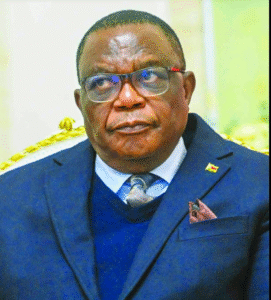CHIWENGA CONSOLIDATES MILITARY POWER AS ZIMBABWE ENTERS DANGEROUS POLITICAL TERRITORY

Vice-President Constantino Chiwenga has made a bold move that signals a major shift in Zimbabwe’s power struggle. By securing key military positions with loyal allies, Chiwenga is tightening his grip on the armed forces—and setting the stage for a possible confrontation with President Emmerson Mnangagwa. With each move, Chiwenga appears to be sending a clear message: he is ready to take over.
The recent appointment of Air Marshal John Jacob Nzvede as the new head of the Air Force of Zimbabwe is not a coincidence. Nzvede replaces Air Marshal Elson Moyo and joins Lieutenant-General Anselem Sanyatwe, the current commander of the Zimbabwe National Army, in what many see as a growing military circle loyal to Chiwenga. This group is now firmly in control of the country’s military machinery.
Nzvede and Sanyatwe’s presence on Chiwenga’s wedding committee was the first clear sign of this political alignment. That wedding—between Chiwenga and military intelligence officer Colonel Miniyothabo Baloyi—was far from a personal event. It was a public show of strength. A calculated political statement. Uniformed generals, intelligence operatives, and senior Zanu PF officials stood as witnesses. The symbolism was loud and clear: Chiwenga has the military behind him.
Chiwenga’s actions are happening at a time when Mnangagwa is desperately trying to secure a controversial third term. But the Constitution is against him. So is a growing section of the military. And now, it appears, Chiwenga is using this moment to position himself as the next leader. It’s no longer just a rumour. It’s a plan in motion.
The November 2017 coup that removed Robert Mugabe from power was the beginning of this new political order. Mnangagwa became president because of the army’s support. Chiwenga, the man who led that coup, expected to take over in 2023. But Mnangagwa changed the plan. He stayed on. And now he wants more time in office—until 2030. This has angered many in the military and in the ruling party. They believe Mnangagwa has betrayed the agreement.
The possible retirement of Zimbabwe Defence Forces commander General Philip Valerio Sibanda could be a turning point. Mnangagwa wants to push Sibanda into the Zanu PF politburo, turning him into a political figure to weaken his influence. But many see this as a trap. Sibanda’s exit could hand even more power to Chiwenga and his inner circle, who are waiting to fill the gap.
This internal battle is not just about politics. It is about power, money, and survival. Chiwenga is not hiding his intentions. By controlling the top military posts, he now holds the levers of power. If Mnangagwa continues to push for a third term, he will have to go through Chiwenga—and the generals backing him.
The international community must pay close attention. Zimbabwe is walking into dangerous territory. The country is not new to coups. It is not new to military interference in politics. What is unfolding now could trigger a serious confrontation. One that may not be solved through elections or dialogue, but through force.
Chiwenga’s rise is not unexpected. But the speed and boldness of his latest moves show that the battle lines are drawn. With Zanu PF already deeply divided, and the military shifting sides, Zimbabwe could be heading for its most serious power struggle since 2017.
Zimbabweans have watched this drama before. Promises of reform, economic revival, and democracy always get lost in the smoke of power fights. Once again, the people are watching from the sidelines as the generals and politicians make their moves.
The military is no longer just a background actor. It is now front and center. The next move—whether by Mnangagwa or Chiwenga—could decide not just who leads Zimbabwe, but what kind of future the country will have. One thing is certain: the fight has already begun.



